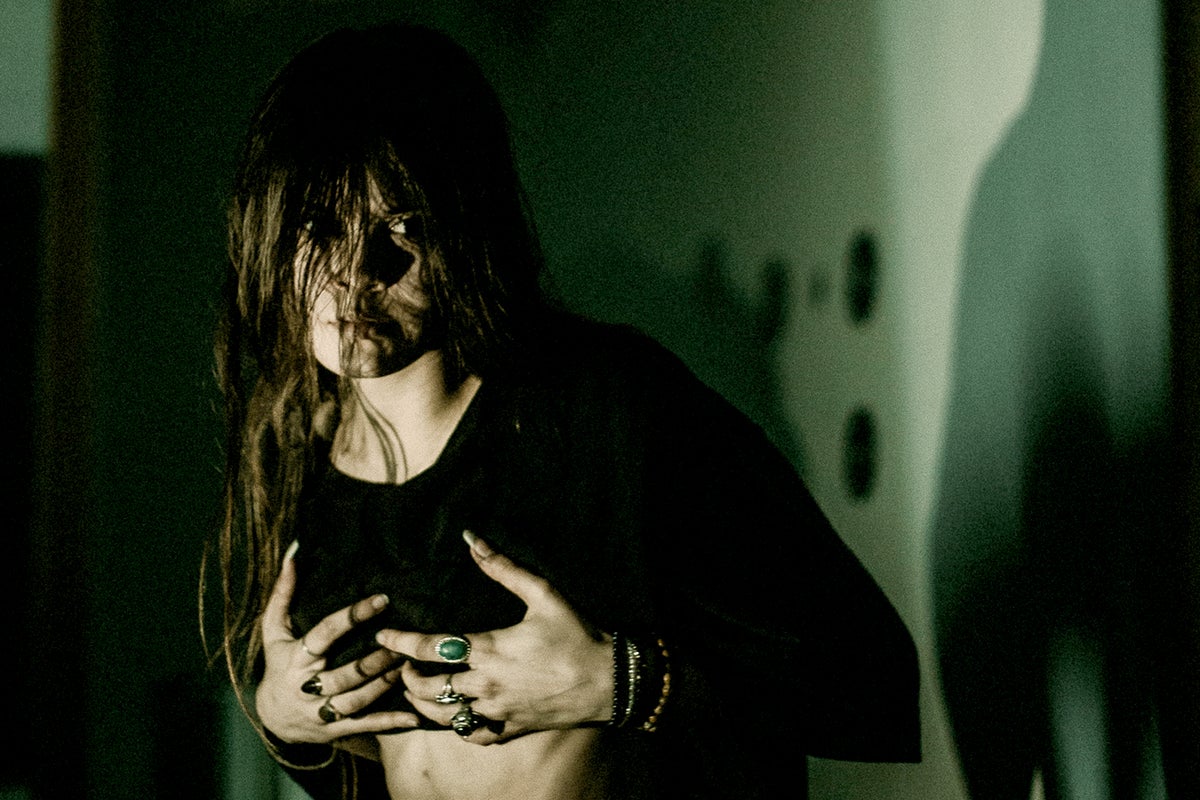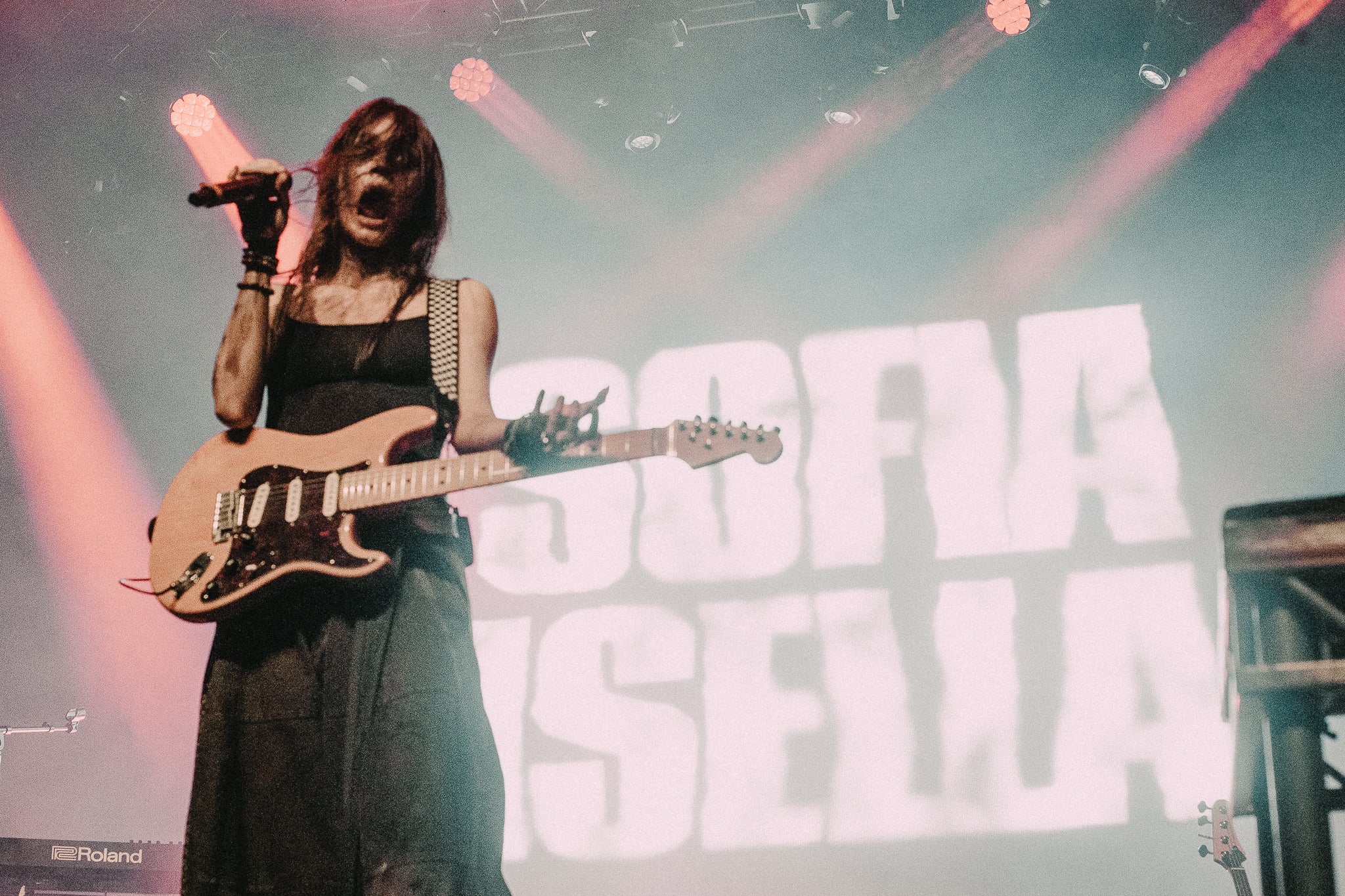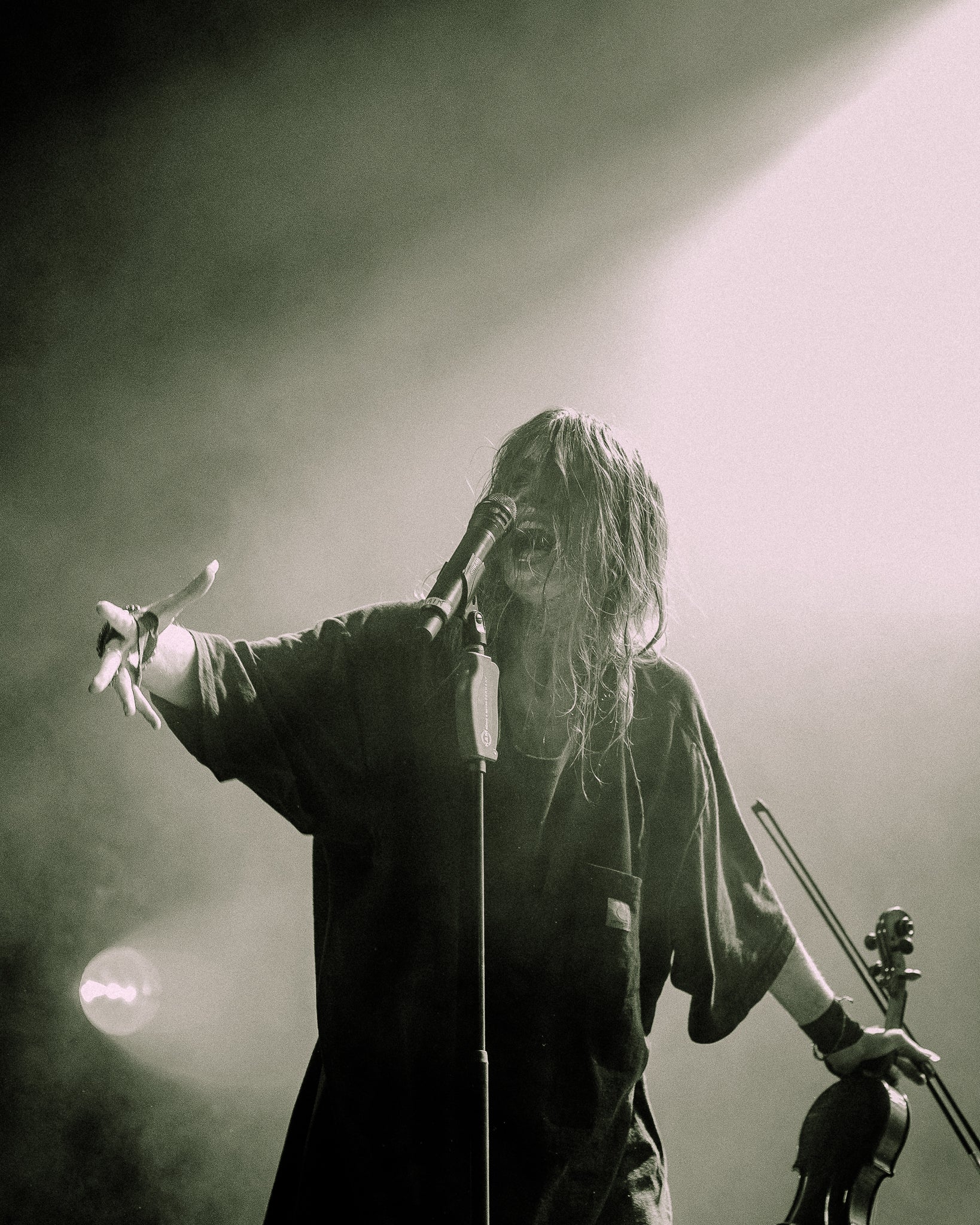
I got called demonic by someone online for the first time the other day,” says the alt musician Sofia Isella, who is not annoyed but in a blissful reverie. “There were other compliments within her message: I have ‘the most ominous aura she’s ever seen in her life’.”
I wouldn’t say these things about the 20-year-old LA native goth at all but I might say she’s mysterious. Across the cafe table from me, she’s completely obscured by a big hood and steampunk glasses. I’m trying to interview her but every question I ask is countered with a softly spoken question. ‘Do you remember what you learned in math class?’ ‘What is your least favourite modern word?’ ‘But what do you think about that?’ As she calmly knits herself a fingerless glove – while wearing it – all I can think is that I’m not surprised that this curious person is a curiosity to 1.7 million people on Instagram. She likes to learn about other people, she says, although this sometimes comes across as passionate debate. “I’m going easy on you…” she adds.
In person, Isella is gentle and thoughtful, but that spikier side exists in her music: acerbic whispered poetry set to Nine Inch Nails-style beats. On the distinctive piano-led track “The Doll People”, she is a dark Regina Spektor, explaining in ironic ASMR tones why women are best enjoyed beautiful and mute: “Art does not interpret itself / There are men with a day to save / We are paintings with legs”.
Isella thinks it might have been her elegant rant “Everybody Supports Women”, about how women inevitably get torn down from every angle, that got the attention of Taylor Swift, who chose her to play at Wembley Stadium on her Eras Tour. Or at least, it was that song that was mentioned in a handwritten letter Swift gave to the singer. “It’s easier to play Wembley than it is to play a bar with two people,” Isella says, shaking off any idea that she might’ve needed some extra nerves to scale up her intimate live sets so dramatically.
Of Swift she says: “She’s the kindest person.” Fifteen minutes before Swift was due to go onstage, she came to say hello to Isella. “She was fully dressed and ready – it was very surreal. It was like seeing Taylor Swift in person,” she adds with a knowing half-smile. But everyone says that Taylor Swift is the kindest person in the world, she admits. “I get asked about Taylor a lot, and every time I feel like I’m answering as though I’m a stereotype, like I’m answering how I should. And I’m trying to figure out how to communicate how that was such a big emotional experience for me in ways I can’t; it’s very frustrating because the words that you use to communicate that are very clichéd.”
Just as difficult to express is the awe of soundchecking at Wembley, to an empty stadium. “What was really impactful about it to me was that the beats I made on my little plastic s***ty keyboard in my bedroom were now being blasted through Wembley’s sound system. It was just nuts,” she says, with a shake of her head.

Isella had been performing early (“much happier”) iterations of her work live to (albeit very small) audiences when she was a young teenager living in Australia before her family moved back to California. In LA she was homeschooled and she believes the freedom this afforded her is completely to thank for her creative career: “Being homeschooled protected my mind a lot,” she explains. “I practised violin three to five hours a day, produced, learned how to do it all myself. Not everybody is gifted that amount of free time. I think boredom is really important for kids. I didn’t get a phone until I was 16, didn’t have social media. I think that really saved me.”
In what way? “Everybody has a very similar social media personality and when I joined social media for the first time it was very obvious to me,” she says flatly. “I was confused about why everybody is acting the same. Now I don’t notice it as much because I’m on it so much. But everybody acts the same. It’s a little creepy.” Then there’s the way it flattens our language, our creative output: “The internet has a lot of inside jokes and if I know an inside joke, I feel ashamed because I don’t want to know what our collective humour is.”
Her own sense of humour is dry and observational, clearly informed by having a childhood inoculated from too many outside influences. Instead of being online, she was reading feminist greats Sylvia Plath and The Handmaid’s Tale author Margaret Atwood. Her father is Chilean-American cinematographer Claudio Miranda, best known for his work on The Curious Case of Benjamin Button and Life of Pi. Together they shoot and edit her eerie black-and-white or sepia music videos, while she creates her own abstract videos for social media. Everything she makes feels strange, certainly untouched by the LA music industry.
Her most recent (very unsettling) EP I’m camera – all confrontational images against industrial soundscapes – feels like a musical museum of taxidermied oddities. “Crowd Caffeine” is a creepy track about how we sanitise the human experience with overuse of technology and has Grimes (another notable Sofia Isella fan and follower) listed as a songwriter. She technically didn’t have a hand in writing it but Isella was heavily inspired by something the electronic musician posted online in 2024: “The machines want to be like humans / humans r trying be like machines / I’m sure we can work smthn out”.

While she’s mostly interested in writing about the experience of women, one song, “Man Made”, is for her male counterparts. “It’s an empathetic approach to them shooting themselves in the foot with masculinity demands,” she explains. When she was 15, she asked lots of her friends the question, “What is the biggest pressure that society puts on you?” The girls said beauty standards. “The men – kind men – all said they felt pressured by other men to talk s*** about women, to be mean to them, to not be a ‘simp’ or whatever that word is… to not love women.” This surprised her, but then human beings are constantly surprising her.
Around the time we speak, she’s preparing to return to the UK to play Reading and Leeds Festival – which took place this weekend – and a short headlining tour. “I’ve always known that this is definitely the world that I sacrifice myself to,” she says of pop music, as though it’s the most normal thing in the world. “Because every world is a sacrifice. You gain something but everything you say yes to, you are sacrificing something else.” Take a Taylor Swift, for example. “Somebody at those big levels, we see their highlight reel, but they’re always sacrificing something.” At present, Isella can walk out into her crowds and hold hands with fans, have meaningful conversations with them even. “I’m small enough now that people still see me somewhat as human.” But it may not be long before she’s seen as less human, more icon, more machine.
Sofia Isella is on a headlining UK tour 26–28 August







